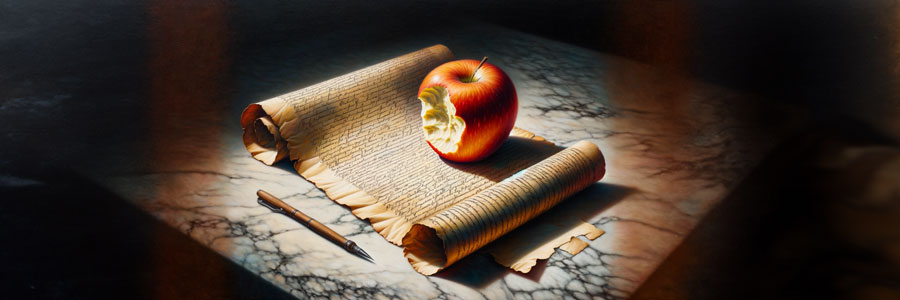Living in Our Excommunicated World

Adam and Eve lived in a world of intimate connection with God until they chose to do the one thing He had left for them to choose not to do. Such a little, arbitrary thing is a bite of fruit, especially when every other tree and bush is available to harvest. They could see that “the tree was good for food” (Genesis 3:6). Such an ordinary thing! A drop of the juice might have dribbled onto Eve’s chin. Perhaps a bit of the skin got caught in Adam’s teeth, to be easily flicked out with a fingernail. The reasoning mind can find no sense in a prohibition, and from a certain point of view, the serpent’s promise that they would not die proved true.
Too late, the reasoning mind realizes the one contingency it puts aside while considering a question. There is no sense in the rule provided that we ignore the fact it is the rule; God insisted on it. Suspend this one detail — only for the sake of argument, to be sure — and of course the prohibition makes no sense. “You certainly will not die,” said the evil one (Genesis 3:4), and he was right… provided that we ignore the death of separation from the paradise of grace.
And so humanity lived, “eating and drinking, marrying and giving in marriage… buying, selling, planting, building” (Luke 17:27-28). Life went on, although we lived in a place separated from God. The spiritual geography available to our immortal souls has only limited regions: Heaven, Hell, Purgatory, Paradise, and Earth. The distinction between the last two, both of which are within material Creation, is the boundary around the State of Grace. After the Fall, we lived in sinful Earth until the Christ called us to the path through a landscape of sin toward grace.
Jesus said, “for this I came into the world, to testify to the truth. Everyone who belongs to the truth listens to my voice” (John 18:37). His interrogator, Pontius Pilate, responded, “What is truth?,” signaling that Jesus need only state unequivocally that he is not a king. Such little, arbitrary things are a few spoken words, and ambiguity is enough for the Roman governor. He can, in good conscience, go out to the Jews and say, “I find no guilt in him.” Take him back, he suggests, and I’ll keep the actual revolutionary, Barabbas.
The ploy fails, and he must side with the high priest, Caiaphas, in the conclusion that “it is better for you that one man should die” so the community can avoid worldly trouble (John 11:50). “Are you the king of the Jews?” Pilate asks, and Jesus replies, “You say so” (Luke 23:3). And Pilate does, with a sign affixed to the cross. He doesn’t believe it to be true, but what does that matter to him?
It mattered a great deal, though, to the rest of us. We have lived these 2,000 years — most of us still struggling along — with a taste of the divine connection in the Eucharist (eating and drinking) and a relationship with God inherited from the apostles through the Church. We’ve stumbled. Our leaders have erred. Yet, when we strive for the truth, we listen to Jesus’ voice calling us along the path to Paradise.
The connection has now been severed. The Church has taken a path away from truth. In “Fiducia Supplicans,” the Holy See has taken such a little, arbitrary step, and so cleverly. “The Church does not have the power to impart blessings on unions of persons of the same sex,” it admits (5). And yet, such an ordinary thing is sex. We can see that it is good for pleasure. We can see that it helps to bind people together in loving relationships. If we can find some way to affirm their attractions — not in every particular, of course, but only what seems positive in them — we can avoid the friction that modernity creates in our Church community. Isn’t it better that one antiquated hang-up should die?
If we just put aside some minor details, we can move “within the horizon” of a spiritual geography in which the Church does indeed have the power to discern the good in the “the possibility of blessings for couples in irregular situations and for couples of the same sex” (31). Redefine the meaning of the word, “couple”; give an “innovative” twist to the word, “blessing”; and ignore, as if it doesn’t exist, the distinction between blessing a person and blessing a relationship. Surely the Church will not die from such trivialities!
Except, like Adam and Eve, the Church has died out of the world of grace. In this new, all too familiar Earth, we’ll go on eating and drinking, marrying and giving in marriage, praying and singing and baptizing. We must get as close to truth as possible. We must pull the Church as much as the path allows toward Jesus’ voice in the distance. He promised Peter, from whom the pope’s authority is supposed to derive, that upon him “I will build my church, and the gates of the netherworld shall not prevail against it” (Matthew 16:18), so we can trust that the Church will recover the path out of sin. The pope could rescind the declaration and repent of its publication today.
Nonetheless, for the time being, we are beyond the State of Grace. While I wouldn’t impose it as a guide for others, my conscience tells me our eating and drinking can only be of the ordinary sort, and so we should not do it within the liturgy of the Mass. Pope Francis has forced us to choose between joining in the Holy See’s lie or rejecting the Holy See as a voice of truth. We are either out of communion with God or out of communion with the Church.
Human error we can tolerate in abundance, but by weaving the trap of an obvious lie, one clever, silly declaration has excommunicated us all.


